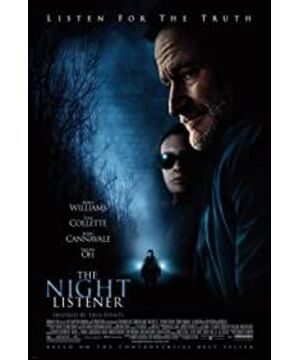Listening to my own fictional story
-Plot analysis of the movie "The Night Listener"
I really haven't had such a movie viewing experience for a long time- After the film ended, I repeatedly thought about the last line, and then suddenly connected everything that was deliberately hidden in the film, and even felt that I was already intertwined with the author's thoughts. The last time I was watching "The Butterfly Effect", I thought of what the gypsy witch said: "You have not ever been.", and I was suddenly surprised.
After watching too many so-called "multiple personalities" bad plots, such as "The Crazy Window", "The Mechanic", and "Curiosity Killed the Cat", these films are only half the time, and the truth is clearly revealed. Is it suspenseful? The phrase "split, in the name of box office" is very pertinent.
"Midnight Listeners" clearly didn't get the compliments I thought it deserved, if not a good one, as a moderately invested indie film caught in the midst of such a hilarious on-screen sensibility, how can such a film from the inside out? Look how unfortunate indie productions — in fact I think so now — obviously won't get enough attention, including from the Oscar judges.
The film is based on a best-selling novel by Armistead Maupin that is said to be based on his true experiences. Of course, I haven't read the original book, but after watching the movie, I can clearly feel that the original book is better than the movie. Honestly the only familiar face in this film, my beloved Mr. Robin Williams, is flatter than any flat Willams I've ever seen, flat like a gay old midnight storyteller - that It's his role, but that doesn't prove that the role is successful, because the bland character is so bland that he has no ego. I heard that Mo Ping himself participated in the production of the film. Could it be that the author played by Robin is so introverted that it was Mr. Mo Ping's inspiration?
This is a story about the communication, doubts, and ultimately a search for the truth between Gabriel, an old broadcaster who hosts the midnight radio station, and Pitt Logand, a 14-year-old boy, the author of a novel he gave up on airing—and his fans.
The truth is just that, and that's not important - Pitt doesn't exist, or is dead, just the blind woman Donna with her fragile heart and miserable soul that needs to be displayed in illusion. Different from the uncertainty expressed by many critics about the existence of Pitt, even if the novel does not have a real material, we can still understand the author's original intention from the details provided by the story.
First of all, when Donna's image officially appeared, it was not the red-haired woman mentioned on the previous phone call, but a blind woman with blonde hair. She gave Gabriel a unique image through Pitt's mouth to hide her identity - this point I will mention it below. Pitt's gone, he must have been a super fan of Gabriel before he died, we can see the layout of his bedroom later - it's more like a boy's bedroom than a young woman's, aka Donna's before she went blind - but Now Pitt's personality has been taken over by Donna, who also adores Gabriel. So when she proved their doubts about her identity by putting Gabriel pigeons on the phone, she cut the line. So then we see some of her performance after Gabriel's arrival, especially reflected in her shyness to put on a red sweater and let Gabriel touch - we know how important touch is to a blind person - she likes Gabriel , although she knew it could only be admiration, because she also knew he was an openly gay and gay activist - remember the flight attendant on the plane.
Regarding the last part of the film, the part of the sound Donna buying a house, it was pointed out in a film review as the real ending, which is obviously wrong. It was a story, a story Gabriel was telling on the radio, a story he had conceived of with the two of them. The heroine's son in the story should also be a character who doesn't appear in the present, like Pitt, who has a leg problem. If you remember a recording Donna made for Gabriel in Pitt's bedroom: "The lights of the highway are streaming past and one of you reaches out and holds the other one's leg. It's the truest moment in the world." I don't Can't prove that what is said here echoes the closing paragraph, but intuitively it does. It certainly wouldn't be the book Pitt wrote, and neither would the story at the end—there's no such mother in Pitt's novels. It is assumed that Gabriel's story began before he began investigating Pitt's origins. So Donna, who had been hoping for any form of care with buried pain in her heart, realized this, and expressed her love in front of Gabriel on purpose, which was a kind of heartfelt gratitude.
At this point, we can almost determine the truth behind this uncomplicated but intriguing story: Donna's real identity is Pitt's mother, and it is conceivable to use Pitt's mouth to call herself red hair is actually a deliberate act Genetic disguise. However, the novels she wrote in Pitt's identity were all about Pitt's experiences. Her original intention may have been to let the idol in front of him tell his story. Perhaps because of writing this novel - as a blind person she couldn't do it on her own, and apparently the whole neighborhood sympathized and actively helped her - she felt that she could use Pitt's personality to directly Communicate with Gabriel, this is probably what Pitt wants to do most before his death.
And thinking of the part where she tried to die with Gabriel on the road, imagine a disabled woman with so many tragic experiences not getting what she thinks is the one who understands them best, someone who can give her the kind of care it expects. Man's trust - even though she knew she had lied - that a woman on the brink of collapse who had lost even her only solace, would act like that.
Speaking of Gabriel, let's not forget his career as a midnight broadcaster, and it's not hard to see why Pitt loves him and his stories. Pitt himself was a victim of a child-abusing father who discovered his father's secret and was subjected to brutal sexual abuse because the cause of his death, Donna didn't need to make up, was AIDS. And the midnight radio station is precisely a program that tells these R-rated stories and reveals the ugly and perverted side of American society. Pitt, who listens to these stories and empathizes with them, naturally admires Gabriel - he is his last warm memory before his death .
Donna's coughing in the tavern already hinted at Pitt's death; Pitt's dead, otherwise there's no reason for his picture to be posted on the pub's window; Pitt's dead, or the police officer who caught Gabriel would have no reason to be so indignant He hits hard.
Donna needs love and needs to be cared for. She may not think she can get her share - although the people in the neighborhood are caring for her, it is only out of sympathy, those loves are too far, too far - so she uses Pitt in front of Gabriel It is also a kind of inheritance of faith between mother and son. Near the end of the film, the author used the Chinese female student living in Gabriel's house - yes, this Asian actress always acts as such a green leaf, remember "Bucket" - it is she who points out A real Donna, a patient with factitious disorder, aka self-hypocrisy, similar to Munchausen Syndrome by Proxy - see the movie "Ghost Call" - is equivalent to multiple personalities that are not mutually exclusive. "The people who have it feel unworthy of love so they make up stuff to get sympathy." This sentence can be said to be a summary of Donna, and even a summary of the truth of the whole film.
Donna needs Gabriel to believe her, whatever she needs, even though she knows her lies are weak in front of Gabriel, she has no choice, so she arranges her last factitious disorde and leaves Gabriel a videotape and that The lint rabbit who only accompanied Pitt through a tragic life...
At this time, after listening to the explanation from the Chinese girl, Gabriel finally understood Donna's difficulties. He did not persuade him in the last call with "Pitt"" She" went to see a psychiatrist, and did not expose the lie, he acquiesced to everything.
As he quotes at the end of the Pitt and Donna Midnight story sewn onto that lint rabbit "Real isn't how you're made. It's the thing that happens to you." This sentence is probably Donna The words that Pitt used to encourage him in his illness, and they still apply to the personality of Pitt fused into Donna, don't they?
Sunshine, warmth, new life - that's what Donna wants Gabriel to tell her in her story, that's for sure!
View more about The Night Listener reviews











